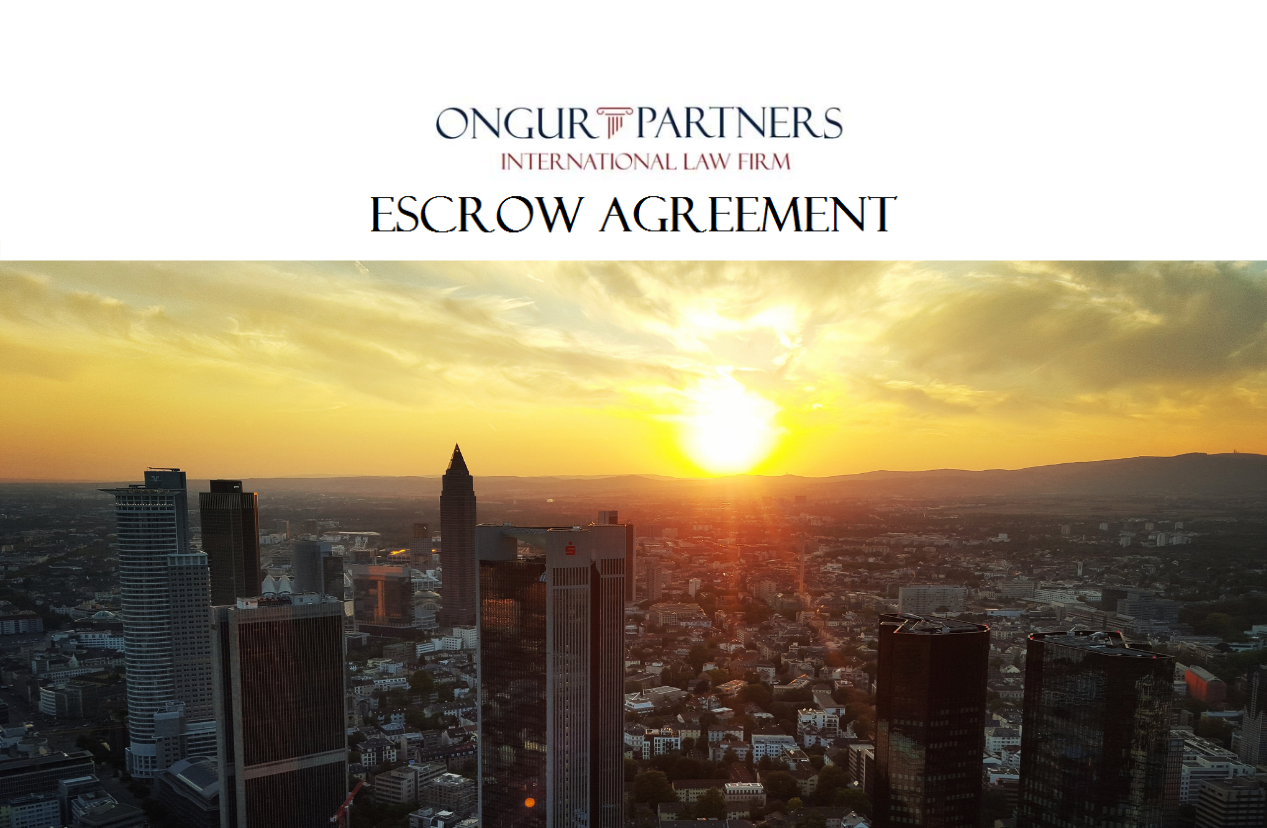ESCROW AGREEMENT
The Escrow Agreement is an instrument that is used in international trade that helps the smooth functioning of economic and commercial life. The Escrow Agreement is used as a guarantee in many transactions, such as the sales of all sorts of movable and immovable goods, intellectual property, business shares; employment contracts, lease contracts, and family law matters all around the world.[1]
It is clear that many issues in economic and commercial life can be addressed by the extensive use of the escrow agreement in Turkey as well.[2] However, while it is a highly preferred legal instrument in the entire world and particularly in America, it is not recognized and enforced in Turkey. This article is about the nature of the escrow agreement, its features, and its examination from a Turkish Law perspective.
Article 97 of the Turkish Code of Obligations adopts the rule of performance at the same time for both parties, but in practice, it is not always possible to perform simultaneously. Generally, one of the parties performs his own performance before; the other party does its performance in return for the performance brought to fulfillment.
In addition, Article 97 of the Turkish Code of Obligations only authorizes the parties of a contract which imposes mutual debt to refrain from performing their own performance if the other party does not perform. However, this provision does not protect the party that has already performed. For these reasons, it is clear that it would be beneficial for the parties to conclude an agreement that guarantees the performance of contractual obligations[3].
Escrow agreements are concluded in order to guarantee the performance of the parties in a contractual relationship. There is an independent and neutral third party, who is called an escrow agent and whose function is to guarantee the fulfillment of the obligations of the parties.
The parties to a contract entrust their contractual performances to the escrow agent, to secure performance by the other party.[4] In short, the parties give up their right of disposition on the asset subject to the agreement in order to guarantee the contractual performances by both parties.[5] The escrow agent then transfers the asset to the person due if the conditions of delivery are fulfilled. In contrast, if the conditions of delivery are not fulfilled, the escrow agent returns it to the person who has transferred it.[6]
The escrow agent is obliged to fulfill its obligations (the obligation of safekeeping the assets and transferring the assets to the parties respectively subject to the escrow agreement) impartially and independently for the fulfillment of the parties’ performances and thereby the correct execution of the main agreement.[7] The delivery process to be carried out by the escrow agent is conducted upon a collective order of the parties to the contract or a court / arbitral tribunal decision.[8]
If the escrow agent transfers the asset before the delivery conditions are fulfilled or refrains from transferring the asset without just cause despite the fulfillment of the delivery conditions; he/she is personally liable for the fulfillment of the performances as per the Turkish Code of Obligations Article 112. Also, if the escrow agent violates his/her obligations, he/she may be criminally liable for abuse of trust.[9]
Although there is the principle of freedom of contract in Turkish law under Article26 of the Turkish Code of Obligations, one condition is that the subject of the escrow agreement must be deliverable to the escrow agent. Therefore, performances consisting of carrying out or refraining from certain actions cannot be the subject of the escrow agreement, as these are not deliverable.[10]
As a matter of fact, under Article 705 of the Turkish Civil Code, the ownership of immovable can only pass to the other party upon registration at the deed registry. For this reason, when an escrow agreement is requested to be made for the sale of an immovable in Turkey, an escrow agreement can only be made for the sales price to be paid by the buyer.[11]
There are no special regulations for the escrow agreement in the Turkish legal system. Therefore, the provisions on the safekeeping agreement and the contract of mandate should be applied by analogy to the escrow agreement.[12] Thus, the escrow agreement may be concluded as a separate agreement from the main agreement between the parties, or it may be made a part of the main agreement.[13]
An escrow arrangement usually requires details such as the name of the escrow agent, the description of the law applicable to the agreement, the escrow funds and the detailed provisions for the release of those funds, the responsibilities and obligations of the escrow agent, the authority and the seat of jurisdiction in the event of a legal action.[14]
As explained in detail above, it is clear that the escrow agreement can be used as an efficient tool for guaranteeing the parties’ performances. Ongur&Partners Law Firm, with significant experience in international contract law stands ready to provide you with the required legal assistance on escrow agreements and other contract types.
[1] Stanley S. Reyburn, Escrows Principles and Procedures, p.6
[2] Ekici, Şerafettin, Escrow Agreement, p.3
[3] Ekici, Şerafettin, ibid, p.25
[4] Usta, Sinan, Escrow Agreement, p.54.
[5] Kırca, İsmail, Escrow Agreement, p.45
[6] Ekici, Şerafettin, ibid, p.22
[7] Usta, Sinan, ibid, p.54
[8] Kırca, İsmail, ibid, p.52
[9] Usta, Sinan, ibid, p.24
[10] Ekici, Şerafettin, ibid, p.23
[11] Ekici, Şerafettin, ibid, p.18
[12] Yavuz / Acar / Özen, Law of Obligations Special Provisions, p. 15
[13] Kırca, İsmail, ibid, p.51
[14] Chen, James, Escrow Agreement



